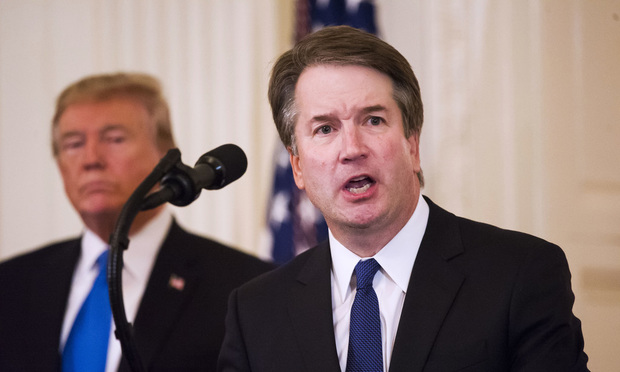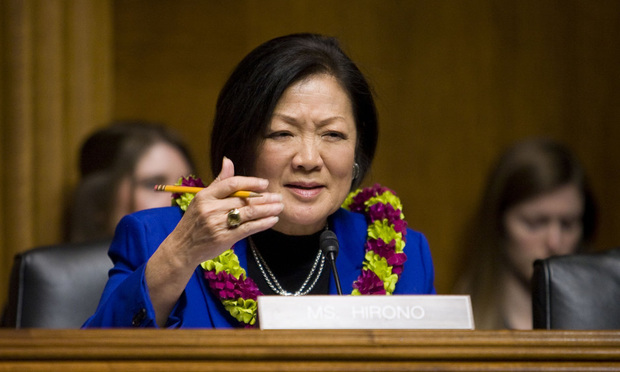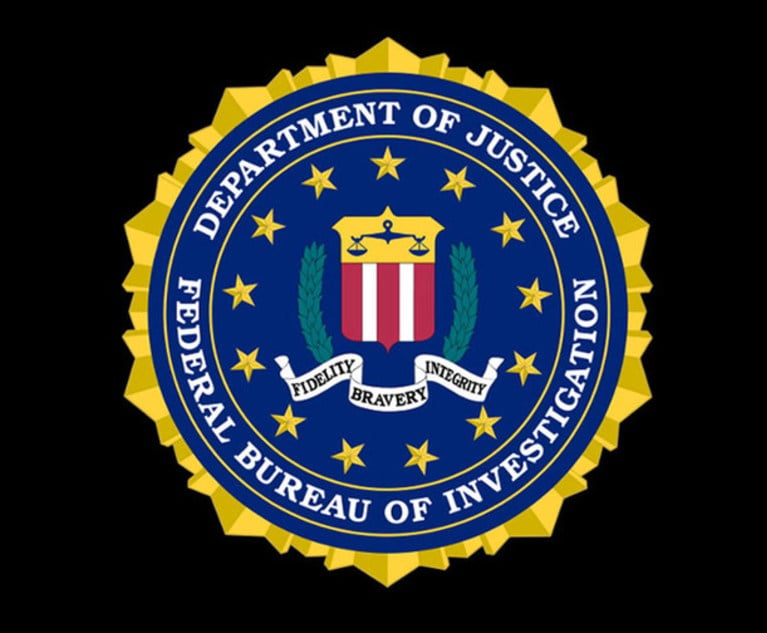Confirmation in Turmoil, Kavanaugh and His Accuser Will Testify at Public Hearing
The extraordinary public hearing into the claims—brought by Christine Blasey Ford, a research psychologist at Palo Alto University—is scheduled to occur Sept. 24.
September 17, 2018 at 06:30 PM
6 minute read
 Judge Brett Kavanaugh addresses the assembled audience in the East Room of the White House moments after President Donald Trump nominated him to the U.S. Supreme Court. July 9, 2018. Photo: Diego M. Radzinschi/ALM
Judge Brett Kavanaugh addresses the assembled audience in the East Room of the White House moments after President Donald Trump nominated him to the U.S. Supreme Court. July 9, 2018. Photo: Diego M. Radzinschi/ALM
Nearly three decades after the nation sat mesmerized by televised hearings into sexual harassment allegations against U.S. Supreme Court nominee Clarence Thomas, a Senate committee publicly will delve into the sexual assault accusation against high court nominee Brett Kavanaugh.
The extraordinary public hearing into the claims—brought by Christine Blasey Ford, a research psychologist at Palo Alto University—is scheduled to occur Sept. 24.
Ford's sexual assault claims have roiled the confirmation process, testing the power of the #MeToo movement and casting some doubt on whether Kavanaugh will be confirmed. The White House said in a statement Monday evening: “Judge Kavanaugh looks forward to a hearing where he can clear his name of this false allegation. He stands ready to testify tomorrow if the Senate is ready to hear him.”
Sen. Chuck Grassley, R-Iowa, chair of the Senate Judiciary Committee, said late Monday, “Anyone who comes forward as Dr. Ford has done deserves to be heard. My staff has reached out to Dr. Ford to hear her account, and they held a follow-up call with Judge Kavanaugh this afternoon. Unfortunately, committee Democrats have refused to join us in this effort. However, to provide ample transparency, we will hold a public hearing Monday to give these recent allegations a full airing,” Grassley said.
Kavanaugh earlier Monday denied the claims that he assaulted Ford years ago when they were high school students in suburban Washington.
“This is a completely false allegation. I have never done anything like what the accuser describes—to her or to anyone,” Kavanaugh, a judge on the U.S. Court of Appeals for the D.C. Circuit, said. “Because this never happened, I had no idea who was making this accusation until she identified herself yesterday.”
Ford also has agreed to appear before the committee, according to her lawyer, Debra Katz of Washington's Katz, Marshall & Banks. Kavanaugh reportedly has retained veteran trial litigator Beth Wilkinson of Washington's Wilkinson Walsh + Eskovitz.
“My client will do whatever is necessary to make sure that the Senate Judiciary Committee has the full story and the full set of allegations to allow them to make a fully informed decision,” Katz said on the news program “CBS This Morning.” “She's willing to do what she needs to do. She's willing, hopefully, to tell her story in a manner that is a fair proceeding.”
Kavanaugh's denial and Ford's public allegation creates a confrontation eerily similar to the Clarence Thomas-Anita Hill faceoff in 1991. Thomas, at his hearing, spoke before Hill.
Reacting to Hill's sexual harassment claims, Thomas said at the time: “I deny each and every single allegation against me today that suggested in any way that I had conversations of a sexual nature or about pornographic material with Anita Hill, that I ever attempted to date her, that I ever had any personal sexual interest in her, or that I in any way ever harassed her.”
Thomas was later confirmed by a vote of 52-48, the narrowest margin in more than a century. He was accused again of inappropriate conduct in 2016 by an Alaskan lawyer who, as The National Law Journal reported, alleged he groped her in 1999 when she was a 23-year-old Truman Foundation scholar. Thomas called the claim “preposterous” and said it “never happened.”
Grassley faced snowballing calls from members on both sides of the aisle and outside interest groups to investigate the allegation against Kavanaugh. Ford revealed in a Sunday Washington Post report that she was the victim of the alleged attempted sexual assault by Kavanaugh when both were high school students in 1982.
In the report, Ford claimed Kavanaugh and a friend, both “stumbling drunk,” locked her in a bedroom in a home in Montgomery Country during the party. Kavanaugh, 17 at the time, allegedly pushed Ford onto a bed, pinning her with his weight and tried to undo her clothes. Ford also alleged Kavanaugh covered her mouth with his hand to prevent her from screaming, according to the Post report. She said she subsequently escaped and went home.
Ford reportedly produced for the Post some of her therapist's notes from 2012, when she said she discussed the alleged assault, but she did not name Kavanaugh. Katz, her lawyer, said Ford passed a recent polygraph test by a former FBI agent.
Even before the sexual misconduct accusation surfaced, the impact of the #MeToo movement was evident during the events of Kavanaugh's nomination and confirmation. Kavanaugh, accepting President Donald Trump's nomination in July, spoke about the role women have played in his life, and he touted his efforts to promote women in the judiciary through his clerk-hiring.
 Sen. Mazie Hirono, D-Hawaii. Photo by Diego M. Radzinschi/ALM
Sen. Mazie Hirono, D-Hawaii. Photo by Diego M. Radzinschi/ALMAt Kavanaugh's confirmation hearing, Sen. Mazie Hirono, D-Hawaii, pressed Kavanaugh about whether he had engaged in any sexual misconduct as a legal adult. Kavanaugh said he had not. He also said he had not faced any discipline or agreed to any settlement related to sexual misconduct.
“I started asking these questions about sexual harassment because it's so hard to hold lifetime appointees to the federal bench accountable and because I did not want the Me Too movement to be swept under the rug,” Hirono wrote.
The stakes in the nomination were already extremely high because President Donald Trump tapped Kavanaugh to succeed retired Justice Anthony Kennedy. Since 2006, Kennedy has been the critical fifth vote in a host of contentious cases, such as affirmative action, abortion, death penalty, church-state separation, and LGBT rights.
The nomination has triggered two major points of opposition: from abortion rights and gay and lesbian rights groups who view Kavanaugh's judicial record as hostile to their interests and from other opponents who question what they claimed was his broad embrace of executive power.
Read more:
Lawyers Who Guided Anita Hill Offer Advice to Kavanaugh's Accuser
Kavanaugh, Amid Sexual Assault Claim, Reportedly Hires Beth Wilkinson
Debra Katz: Kavanaugh Accuser Is Willing to Testify About Misconduct Claims
Kavanaugh Accuser, Speaking Publicly, Puts New Pressure on Republicans
Kavanaugh's Female Clerks Tout His Advocacy for Female Lawyers
Tony Mauro contributed to this report.
This content has been archived. It is available through our partners, LexisNexis® and Bloomberg Law.
To view this content, please continue to their sites.
Not a Lexis Subscriber?
Subscribe Now
Not a Bloomberg Law Subscriber?
Subscribe Now
NOT FOR REPRINT
© 2025 ALM Global, LLC, All Rights Reserved. Request academic re-use from www.copyright.com. All other uses, submit a request to [email protected]. For more information visit Asset & Logo Licensing.
You Might Like
View All


Big Tech Is Cozying Up to President Trump. Here's Why Their Lawyers Are Cautiously Optimistic

Supreme Court Agrees to Hear Lawsuit Over FBI Raid at Wrong House
Trending Stories
- 1Judge Sides With Retail Display Company in Patent Dispute Against Campbell Soup, Grocery Stores
- 2Is It Time for Large UK Law Firms to Begin Taking Private Equity Investment?
- 3Federal Judge Pauses Trump Funding Freeze as Democratic AGs Launch Defensive Measure
- 4Class Action Litigator Tapped to Lead Shook, Hardy & Bacon's Houston Office
- 5Arizona Supreme Court Presses Pause on KPMG's Bid to Deliver Legal Services
Who Got The Work
J. Brugh Lower of Gibbons has entered an appearance for industrial equipment supplier Devco Corporation in a pending trademark infringement lawsuit. The suit, accusing the defendant of selling knock-off Graco products, was filed Dec. 18 in New Jersey District Court by Rivkin Radler on behalf of Graco Inc. and Graco Minnesota. The case, assigned to U.S. District Judge Zahid N. Quraishi, is 3:24-cv-11294, Graco Inc. et al v. Devco Corporation.
Who Got The Work
Rebecca Maller-Stein and Kent A. Yalowitz of Arnold & Porter Kaye Scholer have entered their appearances for Hanaco Venture Capital and its executives, Lior Prosor and David Frankel, in a pending securities lawsuit. The action, filed on Dec. 24 in New York Southern District Court by Zell, Aron & Co. on behalf of Goldeneye Advisors, accuses the defendants of negligently and fraudulently managing the plaintiff's $1 million investment. The case, assigned to U.S. District Judge Vernon S. Broderick, is 1:24-cv-09918, Goldeneye Advisors, LLC v. Hanaco Venture Capital, Ltd. et al.
Who Got The Work
Attorneys from A&O Shearman has stepped in as defense counsel for Toronto-Dominion Bank and other defendants in a pending securities class action. The suit, filed Dec. 11 in New York Southern District Court by Bleichmar Fonti & Auld, accuses the defendants of concealing the bank's 'pervasive' deficiencies in regards to its compliance with the Bank Secrecy Act and the quality of its anti-money laundering controls. The case, assigned to U.S. District Judge Arun Subramanian, is 1:24-cv-09445, Gonzalez v. The Toronto-Dominion Bank et al.
Who Got The Work
Crown Castle International, a Pennsylvania company providing shared communications infrastructure, has turned to Luke D. Wolf of Gordon Rees Scully Mansukhani to fend off a pending breach-of-contract lawsuit. The court action, filed Nov. 25 in Michigan Eastern District Court by Hooper Hathaway PC on behalf of The Town Residences LLC, accuses Crown Castle of failing to transfer approximately $30,000 in utility payments from T-Mobile in breach of a roof-top lease and assignment agreement. The case, assigned to U.S. District Judge Susan K. Declercq, is 2:24-cv-13131, The Town Residences LLC v. T-Mobile US, Inc. et al.
Who Got The Work
Wilfred P. Coronato and Daniel M. Schwartz of McCarter & English have stepped in as defense counsel to Electrolux Home Products Inc. in a pending product liability lawsuit. The court action, filed Nov. 26 in New York Eastern District Court by Poulos Lopiccolo PC and Nagel Rice LLP on behalf of David Stern, alleges that the defendant's refrigerators’ drawers and shelving repeatedly break and fall apart within months after purchase. The case, assigned to U.S. District Judge Joan M. Azrack, is 2:24-cv-08204, Stern v. Electrolux Home Products, Inc.
Featured Firms
Law Offices of Gary Martin Hays & Associates, P.C.
(470) 294-1674
Law Offices of Mark E. Salomone
(857) 444-6468
Smith & Hassler
(713) 739-1250








